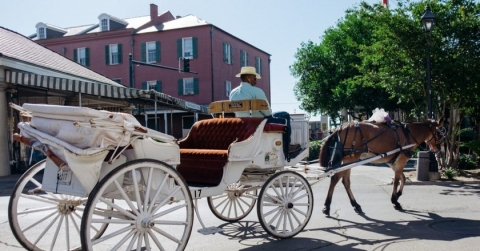
If you have ever visited New Orleans, you know that it has its own vocabulary, and the locals have their own way of communicating. Ever since its 1718 inception, the city’s multicultural settlers have woven their foreign expressions and pronunciations into the shared language and ultimately transformed the dialect into the special jargon it is today. The Big Easy’s linguistic evolution blended decades-old influences from a diverse scenario of cultures and communities. Here’s a crash-course of 15 phrases and words that’ll help you learn how to talk that NOLA talk.
“Pass a good time”
Originating from the French form of pass, “pass a good time” is a phrase used by New Orleans natives when they feel it’s time to start having a good time. It is a recklessly pursuing chant for pleasure and fun. For example, if you go to Pat O’Brien’s and order a Hurricane to drink, you are bound to “pass a good time.”
“Lagniappe”
Pronounced as a French word, lagniappe (lan-yap) is a Cajun-French inspired noun that means “a little extra.” Often used to describe something good, this word is the NOLA-call for receiving anything extra, or better yet, receiving something for free. For example, if you order a Po-boy and you get a free side of fries with it, it’s called lagniappe.
“Who dat?”
A chant mostly yelled in support of the New Orleans Saints, “Who Dat?” is a colloquial expression that originated in minstrel shows and vaudeville acts during late 1800s and early 1900s. It was later taken up by jazz and big band performers in the 1920s and 30s. After the Saints scored their historic Super Bowl win in 2009, the phrase became a theme in the Crescent City and an all-around shout for a celebration. So, if you are watching the game at a local bar and the New Orleans Saints score a touchdown, you better scream “WHOOO DAT” at the top of your lungs.
“Creole”
With a rather ambiguous history, creole (kree-yol) is a French-Spanish inspired term that references pivotal components of the Big Easy culture. Early on, Creole was used to identify the white, rich elite citizens who were born in Louisiana, but were French descendants. As Creoles mixed with New-World-born slaves, free people of color, and mix-heritage descendants, the term gradually came to encompass people of color in New Orleans. As cultures further blended and infiltrated the whole city, the word became synonymous with the city’s overall culture, architecture, local accents, and most importantly, cuisine.
“Cajun”
The word cajun (kay-jen) was derived from Acadia, a term used to reference Nova Scotia and other Canadian provinces, where French immigrants settled during the colonial era. It can seem quite confusing because it holds several different meanings. The first way in which it was used in NOLA was to describe the French-Acadians who, after refusing to swear an oath of loyalty to the British crown, immigrated from Nova Scotia to southern Louisiana in the 1700s. They weren’t comfortable in the city, so they lived on the land and the bayou, making a living by hunting, fishing, catching crawfish, trapping, and farming. A second way the word is used is to talk about the southern cooking style that emerged from this group of people; and a third way is to describe a French-inspired dialect that was spoken by the immigrants and preserved through the generations.
“Pinch the tail and suck the head”
No! This phrase holds no sexual connotation; it actually explains the proper way to eat crawfish (a freshwater crustacean and a New Orleans staple). The trick goes something like this: rip the tail from the body, pinch the tail to loosen up the spicy meat, and, after eating it, suck the head of the delectable critter, where you’ll find all the tasty juices and deliciously seasoned fat.

